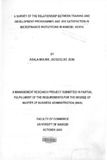| dc.contributor.author | Agala-Mulwa, Jacqline | |
| dc.date.accessioned | 2013-05-10T15:32:37Z | |
| dc.date.available | 2013-05-10T15:32:37Z | |
| dc.date.issued | 2002 | |
| dc.identifier.uri | http://erepository.uonbi.ac.ke:8080/xmlui/handle/123456789/21591 | |
| dc.description.abstract | The survey for the study was carried out between 17th September and 4th October 2002. The study
sought to investigate the relationship between training and development programmes and job
satisfaction in selected microfinance institutions in Nairobi.
The population of interest in the study consisted of three categories/cadre of staff in the
microfinance institutions i.e. the senior level management, the middle level management and the
credit/loans officers. The human resources manager in each institution was identified as the key
person to shed light on the training polices of the institutions. The-information was collected using
questionnaires completed by two representatives from each of the three categories above plus the
human resource manager in each institution. The drop and pick method was used to collect the
questionnaires. Ten microfinance institutions were selected randomly from the list of twenty-two
institutions in Nairobi hence a total of seventy questionnaires were completed.
It was found that there is indeed some relationship between job satisfaction and training and
development programmes. This was evident in the fact that from the findings, the higher the per
capita expenditure on training a category had, the higher was the level of job satisfaction among
the respondents. The credit officers, who ha~ the highest percentage of the training budgets and
opportunities allocated to, also were the most satisfied.
One major issue that was established was that the institutions seem to spend a greater percentage
of their training budget on credit officers who also seemed to be the most satisfied with their jobs.
In particular it was found out that companies that had high per capita expenditures in training also
had high job satisfaction levels. The number of trainings attended also increased the levels of
satisfaction of individuals but respondents were not satisfied with the lack of opportunities to use
and develop their skills and knowledge and their working environment.
From the foregoing, it is evident that training and development programmes and in particular their
frequency, relevance and the amounts spend on them have a significant role to play in the levels of
job satisfaction among staff in microfinance institutions in Nairobi. | en |
| dc.description.sponsorship | The University of Nairobi | en |
| dc.language.iso | en | en |
| dc.subject | The relationship between training and Development programmes and job satisfaction | en |
| dc.subject | Microfinance institutions in Nairobi, Kenya | en |
| dc.title | A survey of the relationship between training and Development programmes and job satisfaction in microfinance institutions in Nairobi, Kenya | en |
| dc.type | Thesis | en |
| local.publisher | Department of Economics | en |

